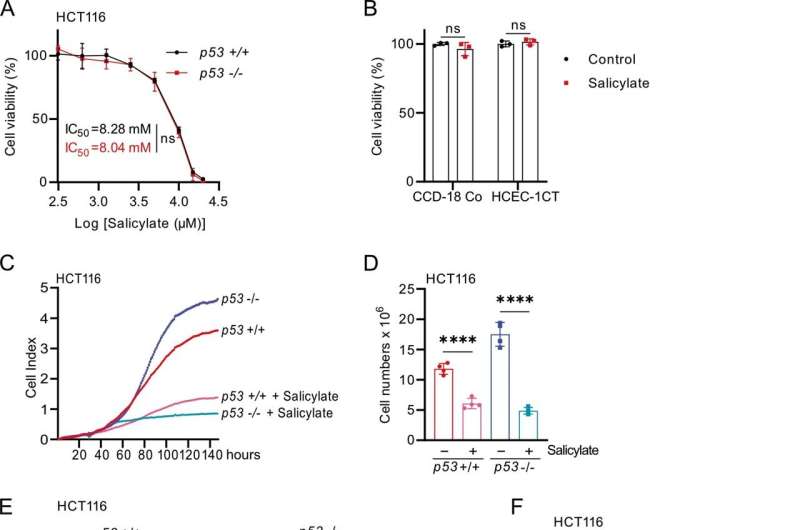This article has been reviewed according to Science X's editorial process and policies. Editors have highlighted the following attributes while ensuring the content's credibility:
fact-checked
peer-reviewed publication
trusted source
proofread
Colorectal cancer: Aspirin found to activate protective genes

LMU researchers have identified a signaling pathway by which aspirin can inhibit colorectal cancer.
Colorectal cancer (bowel cancer) is the third most common form of cancer worldwide, with around 1.9 million newly diagnosed cases and 900,000 deaths every year. Therefore, preventive substances represent an urgent clinical need. Aspirin/acetylsalicylic acid has proven to be one of the most promising candidates for the prevention of colorectal cancer.
Among other findings, studies have shown that when patients with cardiovascular diseases took low doses of aspirin over several years, it reduced their risk of colorectal cancer. Furthermore, aspirin can inhibit the progression of colorectal cancer. Now a team led by Heiko Hermeking, Professor of Experimental and Molecular Pathology at LMU, has investigated which molecular mechanisms mediate these effects.
As the researchers report in the journal Cell Death and Disease, aspirin induces the production of two tumor-suppressive microRNA molecules (miRNAs) called miR-34a and miR-34b/c. To do this, aspirin binds to and activates the enzyme AMPK, which in turn alters the transcription factor NRF2 such that it migrates into the cell nucleus and activates the expression of the miR-34 genes.
For this activation to succeed, aspirin additionally suppresses the oncogene product c-MYC, which otherwise inhibits NRF2.
Overall, the results show that the miR-34 genes are necessary for mediating the inhibiting effect of aspirin on colorectal cancer cells. Aspirin was thus unable to prevent migration, invasion, and metastasis in miR-34-deficient cancer cells. It was already known that the miR-34 genes are induced by the transcription factor p53 and mediate its effects.
"Our results show, however, that activation of the miR-34 genes by aspirin takes place independently of the p53 signaling pathway," says Hermeking.
"This is important because the p53-encoding gene is the most commonly inactivated tumor suppressor gene in colorectal cancer. In most other kinds of cancer, moreover, p53 is inactivated by mutations or viruses in the majority of cases. Aspirin could therefore be employed therapeutically in such cases in the future."
More information: Chunfeng Liu et al, Salicylate induces AMPK and inhibits c-MYC to activate a NRF2/ARE/miR-34a/b/c cascade resulting in suppression of colorectal cancer metastasis, Cell Death & Disease (2023). DOI: 10.1038/s41419-023-06226-9


















